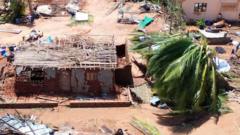At least 34 fatalities have been confirmed in Mozambique following the landfall of Cyclone Chido, characterized as one of the most intense storms to strike the region. The cyclone made landfall on Sunday, delivering devastating winds of approximately 260km/h (160mph), as reported by the National Institute of Risk and Disaster Management (INGD). Most casualties resulted from falling debris, predominantly from collapsed structures. Officials warn that this death toll may continue to rise as the aftermath unfolds.
Chido hit the northern provinces of Cabo Delgado, Niassa, and Nampula, regions that are already accustomed to storm impacts but are also grappling with ongoing threats from Islamist militancy. The cyclone's fury has left over 34,000 families homeless, with critical infrastructure, including schools, health facilities, and fishing vessels, suffering extensive damage. The destruction extends to electric services, with around 200,000 customers losing power due to the cyclone's impact on the state-owned utility company, Electricidade de Moçambique (EDM).
In Mayotte, a French overseas territory that experienced Chido's preceding wrath, the implications have been equally dire. Reports indicate widespread destruction, with a death toll that has officially reached 21 but may involve hundreds more, particularly in communities with large undocumented immigrant populations. Red Cross representatives express deep concern as over 200 volunteers are reported missing. French authorities have imposed a nighttime curfew in the island's search for security following looting incidents.
Amid these calamities, a French lawmaker, Estelle Youssouffa, articulated fears that tens of thousands could have perished, emphasizing the staggering scale of the devastation that damaged 90% of buildings in Mayotte. With thousands missing and reluctance among some individuals to seek shelter—predicated on fears of expulsion—the long-term humanitarian impact is yet to be fully understood.
This cyclone adds to a string of natural disasters, following Cyclone Freddy, which killed over 180 in Mozambique last year, highlighting the increasing frequency and intensity of such storms. The collective devastation in both Mozambique and Mayotte embodies a broader narrative of urgency for global disaster preparedness and climate resilience in vulnerable regions.




















